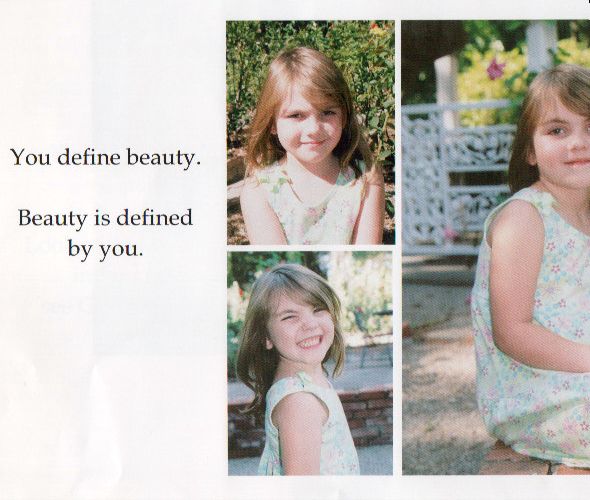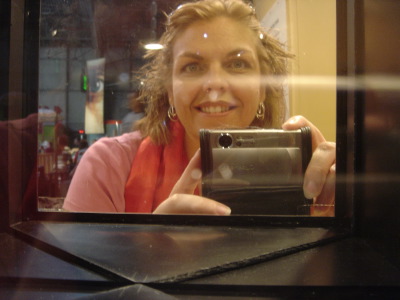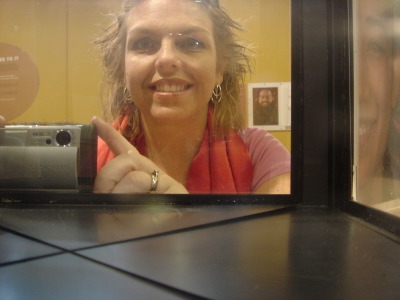

Pages from Ainsley, Perfect You, a book I wrote for my daughter. Steal this idea for Christmas, Please!
Subscribe to my RSS feed and/or email subscription. You don't miss the rest of this series.
My blog has moved!
You should be automatically redirected in 5 seconds. If not, visit
http://thegirlrevolution.com
and update your
bookmarks.


Pages from Ainsley, Perfect You, a book I wrote for my daughter. Steal this idea for Christmas, Please!
Subscribe to my RSS feed and/or email subscription. You don't miss the rest of this series.


Pages from Ainsley, Perfect You, a book I wrote for my daughter. Steal this idea for Christmas, Please!
Subscribe to my RSS feed and/or email subscription. You don't miss the rest of this series.

In everything we've been reading the damaging effects of media has been a central force.
APA Report on Sexualization of Girls, Girls Inc.'s The Supergirl Dilemma, You're Amazing, Geena Davis Institute on Gender in Media all cite exposure to media as a central force in the girls beginning to define themselves as less than they truly are.
While every one of these sources cite media as a potentially damaging influence, they also recommend fighting negative media with positive media.
We have the power to - not just passively ban negative media, which we should definitely do - But we have the power to CREATE positive media for our daughters about girls.
I can tell you this - my daughter thinks it's pretty cool that she's the Poster Girl for Empowering Girls: So Sioux Me. This is one of the reasons I'm inviting you to send photos of your daughter to be included as a Poster Girl on this site. It is one way to take media from outside of our world to a creative and positive medium that includes them.
I created a children's book for my daughter's 5th birthday titled Ainsley, Perfect You. I am practically begging you to STEAL this idea for Christmas (or birthdays).
We read this book before the First Day of School, whenever Ainsley makes negative comments about her self, whenever she feels insecure or whenever she wants. It's a special book that sits out on a shelf and we must wash our hands before reading it.
In the book I addressed issues of beauty, because Ainsley seemed preoccupied with what it was and exactly what criteria people were using to make the judgement about who was beautiful. I addressed school, education, intelligence and learning. I addressed self-worth and a feeling of wholeness and "enoughness." I addressed the meaning of God and her role as a Child of God. I addressed risk-taking and trying new things.
Your family may prize different characteristics or place different values as a priority. What's important, is that you can use this tool to teach her who she is, but also influence, mold and raise or define the bar of expectation for who she will become.
A-N-Y-O-N-E can do this if they have a computer, a camera, $30 and an imagination. You may be thinking you're short on imagination so, while Ainsley, Perfect You is copyrighted I give you permission to steal ideas, concepts, words, etc. Your daughter is every bit as cool as mine, but she may have different attributes and characteristics.
I encourage you to use my book for ideas, but personalize them for your daughter(s). (Of course, its good for your daughter, but don't forget your sons.)
I used www.MyPublisher.com because they were the only company who had a "storybook" feature at the time. Turns out my parents and grandparents were also interested in having a copy of this book (one project many gifts!) and My Publisher has coupons they'll send you frequently. Flickr now offers the feature, and Snapfish and probably all the other ones too.
There are 20 pages so I'll run Ainsley, Perfect You as a series, starting with this foreword. I had to scan the pages, so please forgive the quality.

You'll want to get the RSS feed or an email subscription so you don't miss any of it.
We went to the Exploratorium in San Francisco.
One particular exhibit had a disconcerting effect on me for days.
You sit in between two mirrors and look at your self.

One is a regular mirror and show's you how you see yourself every day. The top photo is how I see myself.

The other shows you what other people see every day. It shows you what you really look like.
Do you see a minute difference between the top photo and the bottom photo?
I've been fascinated by my own emotional reaction. Truly, it was unsettling to see my reflection differently than I do everyday.
The top photo, what I see in the mirror is more attractive to me.
My eyes are uneven in the second photo. The right eye, when looking at it, is slightly lower than the left one.
I find I hold my head slightly tilted in a way that makes my features more even. I think I also hold that eyebrow higher to make the eyes look more symmetrical. I compensate for the flaw I've really only noticed once in a photo when I was pregnant with Zack.
Since you are other people and it's not your face I really have no clue how you are perceiving the attractiveness of the two photos or whether you see the unevenness of my eyes at all. For all I know, everyone who sees me, may choose to make the same correction that I do for myself.
It strikes me as a kindness to myself that my subconscious mind chooses to correct my minor flaw so that I not only feel more attractive, but literally see myself as more attractive.
It also strikes me that people who suffer from eating disorders, like anorexia and bulimia or the emotional disorder of body dysmorphia for some reason they aren't subconsciously fixing their features in their minds.
They are not only seeing their minor flaw - they are focusing on it and magnifying it.
Its also likely they are expecting the outside world, other people, to treat them the way they treat themselves. Did you see how I assumed that others would treat me with the same kindness as I show myself and that others would correct or overlook the minor flaw in their own perceptions, rather than focus on it and magnify it? This assumption is likely a result of my habit of doing such a kindness for myself and for others.
Were I unkind to myself, and if I made a habit of focusing on the minor flaws of other people, I would likely assume that others were also doing so to me.
That's my theory anyway, based on everything I've read about self-esteem, self-worth, and eating disorders and related emotional disorders.
It follows then that maybe we can teach our daughters to serve their own mental health and self-esteem.
Cutting ourselves, our daughters and others some slack for our minor physical flaws teaches, by example, our daughters this emotional skill vital to their self-preservation.
Treating ourselves, our daughters, and others - especially other girls and women - with kindness is also a teachable habit.
Self-love and self-acceptance is a skill. One we learn and one we can teach.
Over one hundred essays poured in from 26 states and four countries. Reading the essays shed light on the current state of the mom-mind. For example, the word 'perfect' (of a variation of it) was used over 92 times. That's almost one 'perfect' for every mom. While I think the questioning of perfection is positive (although not every essay questioned it), the frequency shows that the desire to be 'perfect' continues to loom over our sense of identity.
All too many American women are in thrall to increasingly deranged ideals of perfection. We live in a culture that constantly exhorts us to improve ourselves - and that assumes the perfectibility of virtually everything. If you don't like your nose, get a nose job! If you don't like the color of your hair, dye it! If your thighs are lumpy have liposuction! If you want abs of steel, go to the gym! Personal maintenance has become a national obsession that consumes a staggering amount of energy and resources; if American women put even a fraction of the time they spend on their appearance into working or social and political change, this country would be utterly transformed.



Pages from Ainsley, Perfect You, a book I wrote for my daughter. Steal this idea for Christmas, Please!
Subscribe to my RSS feed and/or email subscription. You don't miss the rest of this series.


Pages from Ainsley, Perfect You, a book I wrote for my daughter. Steal this idea for Christmas, Please!
Subscribe to my RSS feed and/or email subscription. You don't miss the rest of this series.

In everything we've been reading the damaging effects of media has been a central force.
APA Report on Sexualization of Girls, Girls Inc.'s The Supergirl Dilemma, You're Amazing, Geena Davis Institute on Gender in Media all cite exposure to media as a central force in the girls beginning to define themselves as less than they truly are.
While every one of these sources cite media as a potentially damaging influence, they also recommend fighting negative media with positive media.
We have the power to - not just passively ban negative media, which we should definitely do - But we have the power to CREATE positive media for our daughters about girls.
I can tell you this - my daughter thinks it's pretty cool that she's the Poster Girl for Empowering Girls: So Sioux Me. This is one of the reasons I'm inviting you to send photos of your daughter to be included as a Poster Girl on this site. It is one way to take media from outside of our world to a creative and positive medium that includes them.
I created a children's book for my daughter's 5th birthday titled Ainsley, Perfect You. I am practically begging you to STEAL this idea for Christmas (or birthdays).
We read this book before the First Day of School, whenever Ainsley makes negative comments about her self, whenever she feels insecure or whenever she wants. It's a special book that sits out on a shelf and we must wash our hands before reading it.
In the book I addressed issues of beauty, because Ainsley seemed preoccupied with what it was and exactly what criteria people were using to make the judgement about who was beautiful. I addressed school, education, intelligence and learning. I addressed self-worth and a feeling of wholeness and "enoughness." I addressed the meaning of God and her role as a Child of God. I addressed risk-taking and trying new things.
Your family may prize different characteristics or place different values as a priority. What's important, is that you can use this tool to teach her who she is, but also influence, mold and raise or define the bar of expectation for who she will become.
A-N-Y-O-N-E can do this if they have a computer, a camera, $30 and an imagination. You may be thinking you're short on imagination so, while Ainsley, Perfect You is copyrighted I give you permission to steal ideas, concepts, words, etc. Your daughter is every bit as cool as mine, but she may have different attributes and characteristics.
I encourage you to use my book for ideas, but personalize them for your daughter(s). (Of course, its good for your daughter, but don't forget your sons.)
I used www.MyPublisher.com because they were the only company who had a "storybook" feature at the time. Turns out my parents and grandparents were also interested in having a copy of this book (one project many gifts!) and My Publisher has coupons they'll send you frequently. Flickr now offers the feature, and Snapfish and probably all the other ones too.
There are 20 pages so I'll run Ainsley, Perfect You as a series, starting with this foreword. I had to scan the pages, so please forgive the quality.

You'll want to get the RSS feed or an email subscription so you don't miss any of it.
We went to the Exploratorium in San Francisco.
One particular exhibit had a disconcerting effect on me for days.
You sit in between two mirrors and look at your self.

One is a regular mirror and show's you how you see yourself every day. The top photo is how I see myself.

The other shows you what other people see every day. It shows you what you really look like.
Do you see a minute difference between the top photo and the bottom photo?
I've been fascinated by my own emotional reaction. Truly, it was unsettling to see my reflection differently than I do everyday.
The top photo, what I see in the mirror is more attractive to me.
My eyes are uneven in the second photo. The right eye, when looking at it, is slightly lower than the left one.
I find I hold my head slightly tilted in a way that makes my features more even. I think I also hold that eyebrow higher to make the eyes look more symmetrical. I compensate for the flaw I've really only noticed once in a photo when I was pregnant with Zack.
Since you are other people and it's not your face I really have no clue how you are perceiving the attractiveness of the two photos or whether you see the unevenness of my eyes at all. For all I know, everyone who sees me, may choose to make the same correction that I do for myself.
It strikes me as a kindness to myself that my subconscious mind chooses to correct my minor flaw so that I not only feel more attractive, but literally see myself as more attractive.
It also strikes me that people who suffer from eating disorders, like anorexia and bulimia or the emotional disorder of body dysmorphia for some reason they aren't subconsciously fixing their features in their minds.
They are not only seeing their minor flaw - they are focusing on it and magnifying it.
Its also likely they are expecting the outside world, other people, to treat them the way they treat themselves. Did you see how I assumed that others would treat me with the same kindness as I show myself and that others would correct or overlook the minor flaw in their own perceptions, rather than focus on it and magnify it? This assumption is likely a result of my habit of doing such a kindness for myself and for others.
Were I unkind to myself, and if I made a habit of focusing on the minor flaws of other people, I would likely assume that others were also doing so to me.
That's my theory anyway, based on everything I've read about self-esteem, self-worth, and eating disorders and related emotional disorders.
It follows then that maybe we can teach our daughters to serve their own mental health and self-esteem.
Cutting ourselves, our daughters and others some slack for our minor physical flaws teaches, by example, our daughters this emotional skill vital to their self-preservation.
Treating ourselves, our daughters, and others - especially other girls and women - with kindness is also a teachable habit.
Self-love and self-acceptance is a skill. One we learn and one we can teach.
Over one hundred essays poured in from 26 states and four countries. Reading the essays shed light on the current state of the mom-mind. For example, the word 'perfect' (of a variation of it) was used over 92 times. That's almost one 'perfect' for every mom. While I think the questioning of perfection is positive (although not every essay questioned it), the frequency shows that the desire to be 'perfect' continues to loom over our sense of identity.
All too many American women are in thrall to increasingly deranged ideals of perfection. We live in a culture that constantly exhorts us to improve ourselves - and that assumes the perfectibility of virtually everything. If you don't like your nose, get a nose job! If you don't like the color of your hair, dye it! If your thighs are lumpy have liposuction! If you want abs of steel, go to the gym! Personal maintenance has become a national obsession that consumes a staggering amount of energy and resources; if American women put even a fraction of the time they spend on their appearance into working or social and political change, this country would be utterly transformed.

WE EMPOWER GIRLS HERE.
Tools to raise a confident daughter with great self esteem and body image. Subscribe via email or RSS.

